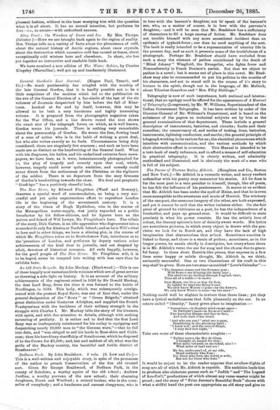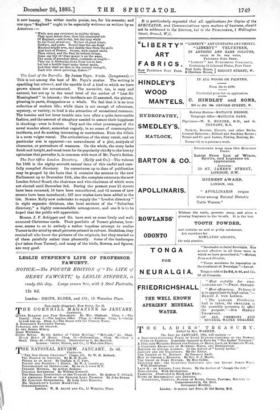The Poems of Thomas Bailey Aldrich. (Houghton and Co., Boston
and New York.)—Mr Aldrich is a versatile writer, and many readers unfamiliar with his poetry may remember his stories. All he does is for the most part in a vein peculiar to himself, though, like all poets, he has felt the influence of his predecessors. It seems to us evident that Mr. Aldrich has been under the spell of Heine, and that he is even more susceptible to the sweetness and music of Herrick. The witchery of the one poet, the sensuous imagery of the other, are both expressed, and yet it cannot be said that the writer imitates either. On the fair- piece of ground he cultivates as a poet, he has the independence of a freeholder, and pays no ground-rent. It would be difficult to state precisely in what his power consists. He has the artist's love of colour, the literary epicure's love of daintily sweet words. His lyrice are sometimes pictures, in which every object is drawn with the pre- cision we look for in Datch art, and they have the lack of high imagination that characterises that schoal. Sometimes emotion is linked to fancy, and there is a strain of pathos ; sometimes, as in the longer poems, he excels chiefly in description, bat everywhere there is in Mr. Aldrich's verse the ear for song'and the charm due to grace_ ful fancy. In those short Herrick-like pieces, that express in a few lines some happy or subtle thought, Mr. Aldrich is, we think, eminently successful. One or two illustrations of his craft in this wayshall be given. Here are two stanzas entitled "Love's Calendar ":— "The Summer comes and the Summer goes ; Wild flowers are fringing the dusty lane,,
The swallows go darting through fragrant rains. Then all of a suddea—it snows.
Dear Heart, our lives so hap dly flow, So lightly we heed the flying hours, We only know Winter i4 gone—by the flowers, We only know Winter is come—by the snow."
Nothing could well be slighter in texture than these lines ; yet they have a lyrical melodiousness that falls pleasantly on the ear. In an octave called "Identity," fancy gives place to imagination :—
" Somewhere—in desolate wind-swept space— In Twilight's land—in No-mnn's land— Two hurrying Shapes met face to face, And bade each wher stand.
'And who are you?' cried one a-gape, Shuddering in the gloaming light ; ' I know not,' said the second Shape,
'I only ditd last night,'" Take one more of these characteristic songlets :— "Toiling scrota the Her de Glace, I thought of, longed for thee ; What miles between nB stretched, alas !—
What miles of land and sea My foe, undreamed of, at my side, Stood suddenly like Fate; For those who love, the world is wide,
But not for those who hate."
It would be unjust to let the reader suppose that swallow-flights of song are all of which Mr. Aldrich is capable. His ambition leads him to produce also elaborate poems such as "Judith "and" The Legend of Ara-Cceli," productions of which almost any verse-master might be proud; and the story of "Friar Jerome's Beautiful Book" shows with what a. skilful hand the poet can appropriate an old story and give to
it new beauty. The writer merits praise, too, for his sonnets ; and one upon "England" ought to be especially welcome as written by an American :—
"While men pay reverence to mighty things.
They must revere thee, thou blue-clitetured isle Of England,—not to-day, but the long while In the front of nations. Mother of great kings, Soldiers, and poets. Round thee the sea flings His steel-bright arm, and shields thee from the guile And hurt of France. Secure, with august smile, Thou sittest, and the East its tribute brings. Some say thy old-time power is on the wane.
Thy moon of grandeur filled, contracts at length—
They eee it darkening down from less to less. Let but a hostile hand make threat again, And they shall see thee in thy ancient strength, Each iron sinew quivering, lioness ! "



































 Previous page
Previous page